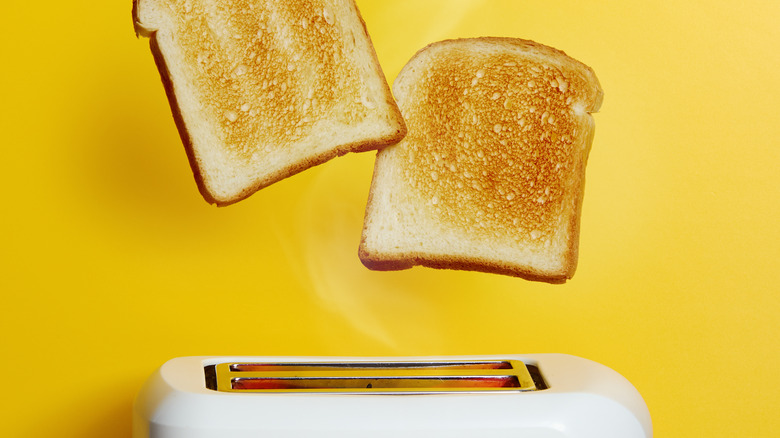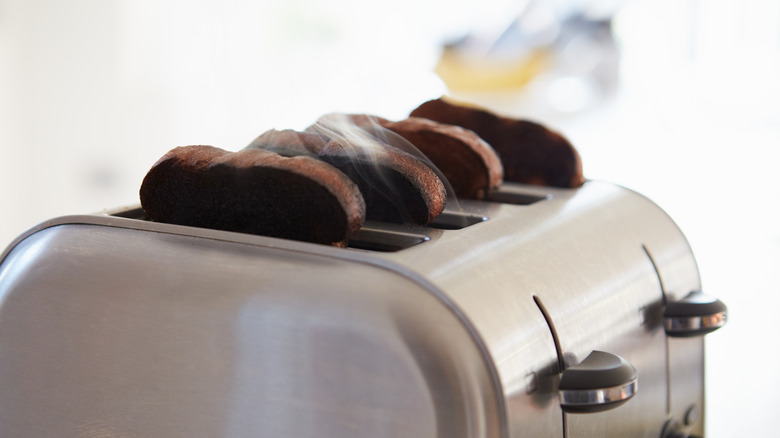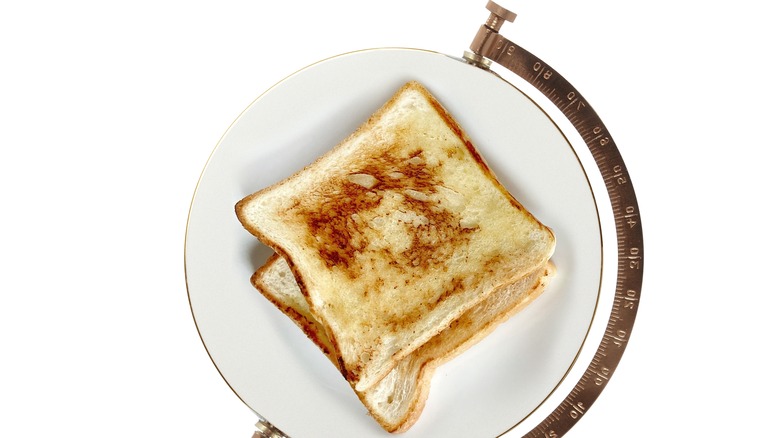Smart Toasters Exist, But Are They Worth It?
We may receive a commission on purchases made from links.
Smart toasters have been a thing for a while now, and for home chefs and those who can't do without their daily gluten-hit, they are devices that are definitely worth considering. Unlike regular toasters, these smart models come with bells and whistles that the plain toast and jam crowd may consider a bit extra, but that work well if you need a device that is closer to a toaster oven (minus the size).
A higher-end toaster's benefits are undeniable when compared with an ordinary inexpensive model. They typically cook faster, have more settings, and are made to do more things than simply toast bread. Plus, a lot of models from brands like Cuisinart and Breville are surprisingly affordable with prices, in most cases, being just a tad higher than budget options. If your toast dreams are not made of this — then what is? Smart toasters attempt to take things up a notch, but are they worth the cost?
What makes a toaster smart?
A regular toaster usually has between two and four toasting slots, a lever to lower the bread, and a knob or buttons to control the temperature or toasting duration. More advanced toasters have since hit the market with higher prices, but at least one company has gone to the extreme of making a smart toaster. The Revolution InstaGLO R270 smart toaster features a full-color touchscreen display rather than knobs, as well as a variety of modes, including one for making paninis. The model offers all of these capabilities alongside an astronomical $400 price tag.
The distinction between the R270 smart toaster and high-end toasters offered at far lower prices isn't very clear, which may leave some consumers confused. Even basic models like the Breville BTA720XL have settings for more than one type of food item, including things like bagels, pastries, waffles, and pop tarts. Other models with far lower price tags have hit the market sporting full LCD and touch displays, as well, including ones like the Seedeem 2 Slice Toaster priced at around $50, blurring the line between a smart toaster and one that is merely high-end.
Ask yourself a question: are toaster accessories even necessary? The companies behind high-end and smart toasters seem to think so. Some of the pricier models come with accessories you can buy separately. For example, the R270 has accessories that include a warming rack and that aforementioned panini press that pops directly into the toaster. The panini press makes all kinds of toasted sandwiches, quesadillas, and melts. It's easy to see the appeal of such accessories, but they alone don't make a toaster smart.
Smart toasters aren't so smart after all
The term smart toaster is a bit of a misnomer. Yes, these models pack LCDs and can handle a variety of baked products, but they lack the wireless connectivity features found on the IoT products for which the smart label is typically reserved. It's clear that a touchscreen alone doesn't make a toaster smart, as many models that fall in the $40 to $60 range pack this feature. The $400 R270 toaster doesn't have any sort of Bluetooth or Wi-Fi capabilities, which isn't surprising considering it's, well, a toaster. The smart features boil down to what Revolution Cooking calls a "smart toasting algorithm" that works with sensors to adjust the toaster's temperature as needed for a perfectly toasted product.
Whether you go with a high-end — but much cheaper — toaster or shell out for something that costs hundreds of dollars, you'll likely face the same notable lack of actual smart features. These toasters can't be controlled remotely with your phone, and they can't be put on a schedule when you're away from home. There's no integration with Alexa or Google Assistant, nor is there any good reason to have such capabilities. They're simply toasters that look great on your countertop, are packed with lots of convenient functions that cover everything from pastries to English muffins, and they're a bit of a novelty that you can talk about with friends. The bottom line is that if you're looking for a machine that can reliably produce the perfect slice of toast, these toasters may very well be worth it — just don't expect IoT-tier smart functionality even at the highest price tags.


